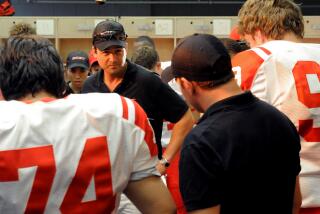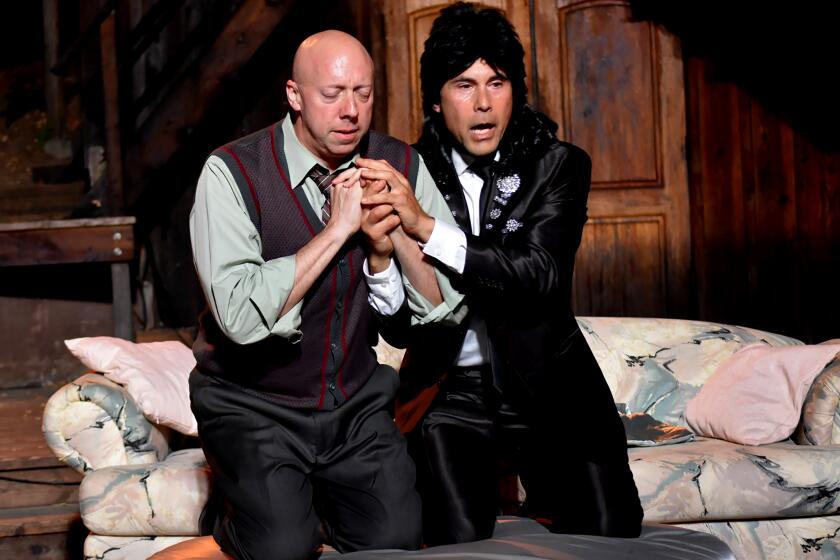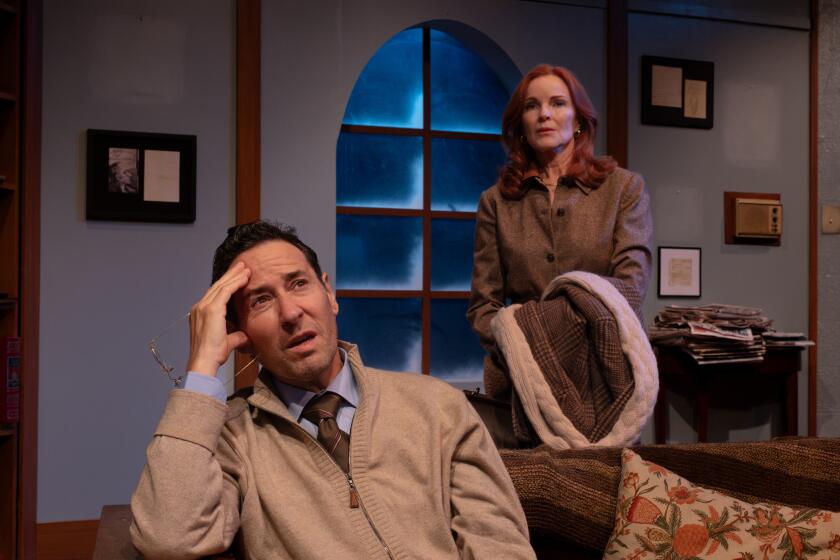Playhouse Season to Open : Theater: The La Jolla Playhouse season opens Sunday with a more hopeful Chekhov play and a new second theater.
The La Jolla Playhouse may be trying to tell us something with its choice of season openers in recent years.
Their 1990 season, which for financial reasons was almost canceled, began poignantly with a hauntingly lovely production of a Chekhov play--”The Cherry Orchard”--a story of a once-mighty house come to ruin because of financial excess.
This year is a time of greater optimism and the Playhouse again is begining with Chekhov: “Three Sisters” opens Sunday at the Mandell Weiss Theatre under the direction of artistic director Des McAnuff. But, fittingly, although “Three Sisters” ends on a more hopeful note than “The Cherry Orchard,” with the sisters determined to survive no matter what, the story is threaded through with themes of suffering, hard work, longing and loss.
The Playhouse has come a long way since its crisis campaign of 1989. But not as far as it would like to have come.
“I don’t anticipate these next few years being easier,” McAnuff said during a rehearsal break in his office. “For a new institution such as ours, there is a certain fragility. Everyone is going to be struggling in these next few years. But we’re definitely in a stronger position than we were in last season.”
One striking difference in this season, which McAnuff and managing director Alan Levey point to with pride, is the company’s dazzling new state-of-the-art thrust theater, the 384-seat Mandell Weiss Forum, which it will share with the UC San Diego theater department beginning later this season. The Forum, which stands a scant 150 feet from the 492-seat Mandell Weiss Theatre (which the Playhouse also shares with UCSD) replaces the 248-seat Warren Theatre, which the playhouse used for a third of its season in past years.
Last year, the Playhouse had a run of plays that generated one of the greatest critical and popular successes in its history; audiences for its six shows filled its houses to an average 96% capacity. That record and the excitement generated by the new theater--as well as
the additional seats that can be sold there--already have brought the Playhouse an increase in subscription sales, according to Levey.
At the same time, in these times of economic recession, the Playhouse continues to be burdened with a deficit, although Levey won’t say how much.
“Operationally, this hasn’t been an easy time,” Levey said. “The growth is enormous and the demands are huge. The reality of the recession is that raising contributions, which is always difficult, is more difficult now. And operating with a deficit is always a problem. It affects cash flow and operations. It’s a drain on the financial resources of the operation.”
Lagging donor support and single- ticket sales have not kept up with the financial demands of putting on the Playhouse’s ambitious season.
A 1989 campaign to raise $1 million--half to cover what at that time was a $703,000 deficit, the other halt to ensure the 1990 season--raised $560,000 in gifts and pledges by Dec. 31 of that year, but it never reached the goal. So while the 1990 season went on as planned, the deficit was not erased. The $703,000 amount was, however, eroded by $200,000 to about $500,000 as of fiscal year 1989, the latest figures available, Levey said.
With only half of the annual budget of $4.6 million covered by ticket sales, these days the Playhouse continually faces the annual struggle to raise enough contributions to cover the rest of the costs, at the same time that it is working on reducing the deficit.
Despite the challenges, Levey is optimistic. “The potential growth is now larger than it has ever been as a result of the additional seats. And if we are successful at taking advantage of that additional potential income by selling those seats, then our earned income will go up by that ratio. Also the addition of the Mandell Weiss Forum has shown itself to be an advantage both in terms of its location and because it’s a brand-new comfortable building.”
The financial crunch at the Playhouse is echoed at theaters both locally and nationally; in San Diego alone, crisis campaigns currently are going on at the San Diego Repertory Theatre, the Gaslamp Quarter Theatre Company and the Bowery Theatre.
And nationally, things aren’t any better, said Thomas Hall, managing director of the Old Globe Theatre. Hall also serves as president of the national League of Resident Theatres, working with other under financial stress, including the Guthrie Theatre in Minneapolis and the Long Wharf Theatre in New Haven, Conn.
“Right now I think it’s a national widespread trend,” Hall said. “The real problem we have is that theaters which were on an unstable footing in the last six to 12 months are in much worse shape. A lot of what I try to do is deal with specific issues. I let people know there’s just going to be a period of a year or two of retrenchment and reprioritizing where we are and what we’re doing.”
Still, like the main characters in “Three Sisters,” the Playhouse goes on dreaming of better times. There is a plan on the boards for a third theater near the other two--it would be a 500-seat flexible black box theater that would allow the Playhouse to produce year-round. That dream may be years away, but as early as 1992, McAnuff said he expects to be able to extend the season from late November, when it closes now, into December or early January. He said he is not sure whether that will mean extending the runs in the six-play season or putting on an additional show.
And, in these hard times, the Playhouse seems to cling more strongly than ever to its goal of defining itself as “a home” for artists, as McAnuff describes it.
“We’ve gone to artists we’ve really believed in, who have created some kind of body of work, and asked them what they wanted to do,” McAnuff said.
As a result, many of the writers, directors, performers and designers of this year’s season will be familiar faces. Starring in “Three Sisters” as two of the three sisters are Nancy Travis, who starred in “My Children! My Africa!” at the Playhouse last year, and Phoebe Cates, who last performed at the Playhouse in 1985 under McAnuff’s direction in Chekhov’s “The Sea Gull.”
Also, Michael Constantine--who won a San Diego Critics Circle Award for best actor for his work in the Playhouse production of “A Walk in the Woods”--will play Chebutykin in “Three Sisters. And film and stage actress Susan Berman, another Playhouse veteran who happens to be McAnuff’s wife, will play the sister-in-law, Natasha.
The next show, “Fortinbras”--a comic continuation of Hamlet that will inaugurate the Mandell Weiss Forum on June 23-July 28--is by Lee Blessing, who wrote “A Walk in the Woods,” as well as three other plays produced by the Playhouse.
After that comes that famous clown Bill Irwin in his fourth Playhouse appearance, “The Regard of Flight” and “The Clown Bagatelles,” July 7-Aug. 11, at Mandell Weiss Theatre. Then playwright Eric Overmyer will work with director Stan Wojewodski Jr., newly designated artistic director of Yale Repertory Theatre, on Overmyer’s newest play, “The Heliotrope Bouquet by Scott Joplin and Louis Chauvin” at the Forum, Aug. 11-Sept. 15. The two collaborated last year on “Don Quixote de la Jolla” at the Warren Theatre.
“We felt we would invite people back as part of the celebration of the new theater,” McAnuff said. “We’ve gone to artists we’ve really believed in, who have created a body of work at a certain level and asked them what they wanted to do.
“The American theater is not that vast a landscape when you’re dealing with good artists,” McAnuff said. There’s only one Bill Irwin, one Athol Fugard, one Geoff Hoyle. So when you have a chance to develop a relationship with someone who is a leader in a field, you want them to feel as if they have a home.”
Fugard, the internationally renown South African playwright, is one of the newer friends of the Playhouse. He first worked there last year when he directed the Southern California premiere of his latest play, “My Children! My Africa!”, which received critical acclaim in San Diego and in a later Playhouse production of the work in Los Angeles.
Fugard had talked about presenting the American premiere of his latest work at the Playhouse. But since the work wasn’t ready in time for this season, he opted to direct and perform in one of his earlier plays, “A Lesson From Aloes,” Aug. 25-Sept. 29 at the Mandell Weiss Theatre. McAnuff said Fugard may allow the Playhouse to present the American premiere of the new work here next season.
The season will close with the musical “Elmer Gantry,” which was proposed to McAnuff by its composer, Mel Marvin, also one of the composers of the score for “The Cherry Orchard.” The show runs Oct. 20-Nov. 24 at Mandell Weiss Theatre.
As he rushed through dinner in a hurry to get back to work, McAnuff mused that what he has learned professionally and personally in the nine years since he took over the Playhouse has deepened his understanding of “Three Sisters.”
In 1983 he came here as a hotshot 29-year-old New York director and started off with a three-play, 11-week Playhouse season. Now he’s a 38-year-old distinguished artistic director with 41 productions behind him who is facing a season of six plays over a period of seven months--three of which he’s directing himself, a feat for even the best in the trade. And, he said, the birth last July of Julia Violet, his first child, was an event that has made him “conscious of time passing and mortality,” elements that he described as “critical” in understanding this play.
“I feel like a character in ‘Three Sisters’,” he said. “I’m not sure how equipped I would have been at 30 or 31 or 32 to do this play. . . . One of the things that equipped me to understand ‘Three Sisters’ is that I understand more of their longings. It helps me to take stock of my life and to appreciate that it’s all here, and if you put energy into something, it should be coming back.”
More to Read
The biggest entertainment stories
Get our big stories about Hollywood, film, television, music, arts, culture and more right in your inbox as soon as they publish.
You may occasionally receive promotional content from the Los Angeles Times.






